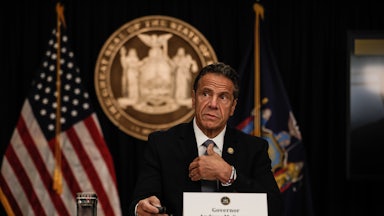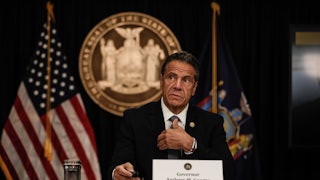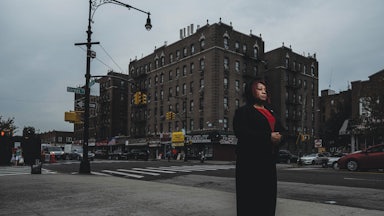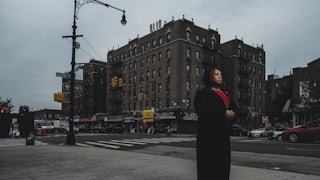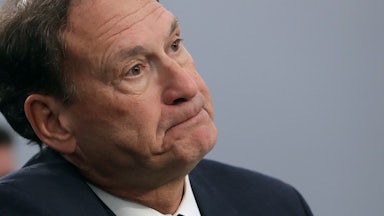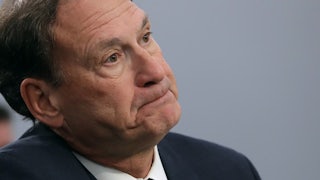“You make that gown look good,” New York Governor Andrew Cuomo told Dr. Elizabeth Dufort in front of reporters back in May of last year, as she tested the governor for Covid-19 during one of his PowerPoint-packed, dad-joke-heavy coronavirus press conferences. When Dr. Dufort asked him to lift his head up and close his eyes, Cuomo paused—“Why do I need to close my eyes?” he asked—and mugged for the press, “You can question the doctor.” The doctor may have known that she was signing up for the governor’s spectacle. Still, Cuomo’s comments belied the fact that he thought teasing her for trying to do her job was just another joke.
Cuomo’s daily televised management of a health crisis by PowerPoint elevated his national profile and somehow garnered him an Emmy. The performances also exposed a cascading series of allegations of misconduct by Cuomo to a wider audience: his mishandling the Covid crisis, along with his attempts to bully lawmakers who sought to hold him to account. “Assemblymember Ron Kim spoke out publicly about the intimidation and abuse he has faced from Governor Cuomo and his aides,” wrote Lindsey Boylan, who had worked for the governor. “I’m compelled to tell my story because no woman should feel forced to hide their experiences of workplace intimidation, harassment, and humiliation—not by the governor or anyone else.”
Boylan is one of three women to come forward in the past week, two with multiple allegations of sexual harassment and other abuses of workplace power, and one, who was not working for him, who says the governor made repeated, unwanted sexual advances toward her. Cuomo has alternatively denied and offered nonapologies—“I acknowledge some of the things I have said have been misinterpreted as an unwanted flirtation. To the extent anyone felt that way, I am truly sorry”—for his actions.
While some political observers debate which failure will be the governor’s downfall—“Just to be absolutely clear, the thing Cuomo should resign over is the nursing home deaths. Getting hundreds or thousands of people killed and then trying to cover it up is significantly worse than sexual harassment,” opined one Reason editor—others seem to have given up. “My guess is that if this scandal had broken a few years ago, high-profile Democrats would have felt no choice but to call for Cuomo’s resignation,” wrote New York Times opinion columnist Michelle Goldberg. “Since then, however, a few things have happened. After the killing of George Floyd and last summer’s protests, the locus of our culture wars shifted from sex to race.” Both kinds of takes rely on drawing an unnecessary and untrue divide. They fall back on the stubborn framing of sexual harassment as a “women’s issue.”
To the extent that people conceptualize sexual harassment as existing on a continuum of gender-based violence, it tends to cloud over the fact that it also exists on a continuum of labor abuses. But focusing on sexual misconduct is a neat way of evading the much broader power of bosses. And Cuomo is, if nothing else, a boss. His targets are often women workers in subordinate positions, whether or not they report to him personally.
The nursing home scandal centers on the harm done to elderly residents but concerns, too, the care workers, who, disproportionately, are women of color. (Nursing home residents are also predominantly women, as are informal caregivers.) When Cuomo’s actions crowded sick people into nursing homes, he exposed those women workers, too. Likewise, when Cuomo says he wants New York schools to open five days a week, without a plan to ensure the health of students and teachers alike, he is putting a majority-women workforce at needless risk.
This is not an either/or; in fact, the two stories have collided and collectively chipped away at Cuomo’s bully impunity. The Democrat who stood up to Cuomo over nursing home deaths, and whom Lindsey Boylan referenced in her story of harassment, is New York State assembly member Ron Kim. Before the pandemic, Kim could be found on the streets of Flushing, Queens, a predominantly Asian American and immigrant neighborhood he represents, calling attention to the workplace abuse and death of a young woman, Yang Song, who lived there. During a New York Police Department raid on the Flushing massage parlor where she worked in 2017, Yang fell or jumped from a window and soon after succumbed to her injuries. Her family said a man who represented himself to her as a police officer had sexually assaulted her and pressured her to become an informant. Kim has since supported immigrant women workers fighting workplace abuse and police harassment in massage businesses—for which he was gratuitously criticized by the tabloids—and he backs the efforts to defund the police driven by the summer’s uprisings against police killings. Both these forms of abuse and violence can be intimately connected.
The connections are there, too, on Cuomo’s own professional turf. Before the recent accusations against Cuomo, women who had worked in state government in Albany convened a landmark series of hearings on sexual harassment, as much an issue of sexism and cronyism as it was an abuse of power at work. Women testified to the obstacles they faced in reporting harassment in a range of workplaces, not only in government, and what felt like attempts at cover-ups. Cuomo even commented on the hearings, “I am very proud that New York is the most aggressive state in the country on women’s rights. Anything else we can do on sexual harassment we will do.”
All this has been building, and the common denominator is the abuse of power. “The accounts of sexual harassment from the women who have courageously come forward confirm what many in Albany have known for years: that Governor Cuomo uses his power to belittle, bully, and harass his employees and colleagues,” six socialist legislators, including Julia Salazar, who co-chaired the sexual harassment hearings, wrote in a statement Tuesday. They know the culture of impunity in which Cuomo operates because they have to work there, too.
Cuomo’s boss-state may be folding in part because his apparent abuses of power target women far outside his workplace. Likewise, abuses of power aren’t gendered only when they manifest as sexual harassment. Neither do such abuses of power remain confined there. “The behavior by the governor and his administration has really prevented New York from having good governance,” New York state Senator Alessandra Biaggi, another chair of the Albany sexual harassment hearings, said in a recent interview. “There’s a culture of belittling people, there’s a culture of screaming at people, and really just making people feel badly. It’s definitely come from the top and it is perpetuated by those who are most closely surrounding him.”

